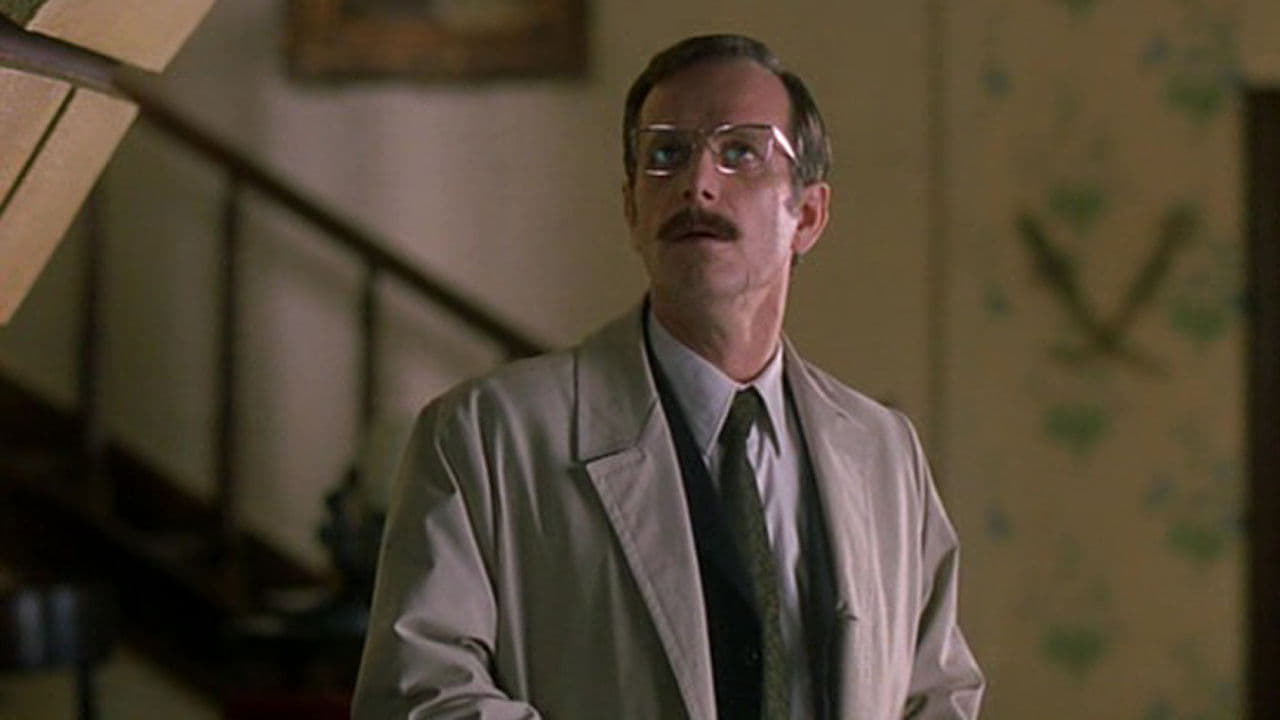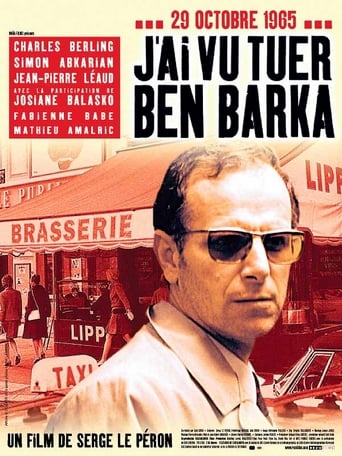



Best movie of this year hands down!
An absolute waste of money
This is a small, humorous movie in some ways, but it has a huge heart. What a nice experience.
View MoreA clunky actioner with a handful of cool moments.
Taking part in a poll on ICM for the best movies of 2005,I started gathering DVDs to watch. Only knowing the interesting "Fingers" remake The Beat That My Heart Skipped as a French title from that year I started searching on Amazon UK,and stumbled on a "ripped from the headlines" Neo-Noir,which led to me meeting Ben Barka.The plot:Lying dead in a pool of blood,movie producer Georges Figon talks from beyond the grave on how he got here.France in the 1960's:Gaining a footing in the French African colonies, Ben Barka starts undermining the power of the De Gaulle government with calls for the colonies to have their own democracy. Recently out of jail, Figon is approached by a rich stranger who wants him to make a documentary about decolonization that will be shown at a major political summit. Accepting the offer,Figon hires film director Georges Franju and scriptwriter Marguerite Duras to begin work on the project. Needing an adviser for the project,Figon decides to ask for Ben Barka,whose arrival leads to the government giving Figon film an unexpected ending.View on the film:Ripped from the headlines of a case kept secret for 40 years,co- writers/(with Frédérique Moreau) co-directors Serge Le Péron and Saïd Smihi smartly reveal in their screenplay that fact is stranger than fiction,with the writers sticking to the known facts of Barka's "disappearance." Opening with a dead Figon,the writers rub the title in warm Hollywood Film Noir oils,from the masks and reels of films hanging on the walls being ornaments of Georges Franju's past,to Figon discovering that the sun-kissed streets of Paris are a criminal façade.Digging out archive footage of De Gaulle saying that anyone who says the government was involved is trying to "Undermine" France, (good to see political dialogue has matured so much in the ensuring years)the writers keep exposition to a minimum,in order to build a Noir web of doubt over who is starting to surround Figon and Barka's production. Backed by a Jazzy score from Joan Albert Amargós and Pierre- Alexandre Mati,the directors and cinematographer Christophe Pollock draw a Moroccan "evil under the sun" Neo-Noir aura across the flick,as the narration from Figon hovers above the shadowy figures keen to make Barka "disappear."Welding eyes to a face, Jean-Pierre Léaud gives a scene-stealing performance as Franju,whose joy in his past creations is cast across Franju's face,with a subtle awareness from Léaud on the brutal struggle Franju is trapped in to get any project off the ground. Putting everyone's noses out of joint, Charles Berling gives a great performance as Noir loner Figon,with Berling giving Figon a casualness to the underbelly of the city due to the years he has spent stuck inside it, until it hits Figon that he is the one who saw who killed Ben Barka.
View MoreSerge Le Péron's I Saw Ben Barka Killed/J'ai vu tuer Ben Barka has Jean-Pierre Léaud playing French Forties cult director Georges Franju, and an actress called Josiane Balasko as Marguerite Duras. They're contacted by a con-artist, ex-con and would-be artist-intellectual named Georges Figon (French film everyman Charles Berling), who's been in turn contacted by mysterious others to start a project: a film about French colonialism, which will use exiled Moroccan revolutionary leader Mehdi Ben Barka (Simon Abkarian) as its historical adviser.Figon (also a historical figure, if of less note) has no particular business being involved in such a thing, but his handlers knew he would want to: he's out for the main chance and figures to get rich and make his actress girlfriend famous by doing it. The year is 1965.Figon meets with Ben Barka briefly in a hotel in Egypt with men he doesn't realize are intelligence agents (one of them played by Matthieu Amalric). Ben Barka agrees to work on the film.Later Ben Barka comes to Paris to consult, but just before his first meeting is intercepted on the street along with a young Moroccan intellectual whose help he's soliciting for the project. And that's the end of Ben Barka. Later in the day Figon's there, cooperating, when Ben Barka is upstairs somewhere outside Paris being tortured; but flexible though he may be, Figon comes down too. He was only a pawn in the game.We see actual footage of then President Charles De Gaulle at a mega-press conference denying any French government knowledge of or involvement in the wacking of Ben Barka. Shots of Figon's body in a pool of blood on the floor (neatly suited as throughout) bookend the piece. He's dead, but he narrates the movie post-death.The aim of this nourish fictionalization is to dot i's and cross t's on a government assassination that could be considered an important footnote on the history of French colonialism. Unfortunately the noir hints only point up J'ai vu tuer's colorless generic quality. It never comes up with explanations of the deeper motives of the events it spotlights (why Ben Barka? Why now?) or gathers much real momentum, Figon hogs the screen while remaining a colorless shill. Actor Abkarian endows Ben Barka with dignity: he's like a North African Yves Montand (one remembers Montand's aging revolutionary in Resnais' 1966 La guerre est finie). But Ben Barka is only the indirect focus of the film, a backdrop for Figon's story.The cloudy sources of the Ben Barka assassination would certainly be of concern to students of modern French politics. But despite respectable period mounting and a nice jazz score meant to evoke Le Péron fave and French Noir great Jean-Pierre Melville, this seems from an American point of view to be a misguided project of limited interest with no precise sense of style. It appears to have been the hands-down choice for most pointless inclusion in Lincoln Center's Rendez-Vous with French Cinema Today, March 2006 edition.(J'ai vu tuer Ben Barka opened in Paris November 2, 2005.)
View More"J'ai vu tuer Ben Barka" may not qualify as the masterpiece of the twenty-first century, it is nonetheless well worth seeing.Its prime quality is its high informative value. Never so much has been said and in such precise details about the Ben Barka case as in this film. The first version, "L'attentat" by Yves Boisset was good but a bit vague and confused, but Le Péron and Saïd Smihi's present effort is as accurate as can be about the facts,protagonists (who bear their real names)and period details. It notably amazed me to learn that people connected with the French movie world had been (unwittingly) involved in this political scandal. I am a film buff but I never knew to this day (or had I forgotten?) that director Georges Franju, writer-director Marguerite Duras, actress Anne-Marie Coffinet had something to do with the abduction and elimination of the Moroccan opposition leader.Another good point is the choice of Georges Figon as the (dead)narrator. As the man is a shady individual (nervously portrayed by fidgety Charles Berling), confusion first prevails but the story being told three times, it gets clearer and clearer as it unfurls. Costa Gavras would have chosen a white knight figure as a hero, not Serge Le Péron, whose accusatory tone is made all the sharper by apparent ambiguity.Jean-Pierre Léaud is a stunning Georges Franju depicted as a dreamer a bit cut off from the outside world but Josiane Balasko is only fair as Duras. I personally preferred Jeanne Moreau in "Cet amour-là"A good quality political thriller, not unworthy of its model of the seventies. Go and see it soon, for the houses which show it are far from packed.
View Moreit takes courage to make a stylish film nowadays, especially about a neglected -nearly obsolete today shall I say- political scandal. Through a clever use of newsreel footage, it brings us to a crucial thought: the 60s attended the birth of some major humanist leaders from Che Guevara, Ho Chi Min, Martin Luther King to Ben Barka who were mostly to be assassinated. Its highly-charged atmosphere and frantic pace reminded me of some Billy Wilder film noir pictures of whom the director must have definitely been under the influence,let's say the voice-off intro of Charles Berling talking about his story while we're seeing him lying dead on the floor of his apartment sends you directly to Sunset Bld. -without the bloody swimming-pool, the chaptered montage winks at Fortune Cookie,... which is overly rejoicing not only because of that Wilderesque presence but it shows that somehow some directors still bears in mind that movies -whatever their subject- have to be entertaining in a sense that they'll procure pleasure to its viewer. A lot could be said about the effort of historical reenactment: in spite of its obviously low budget -see Berling's mustache and fake scar, it's very efficient thanks to its brilliant casting - Jean-Pierre Léaud as a paranoid Georges Franju, an impressive Simon Abkarian as Ben Barka, only Josianne Balasko seems not very convincing in an obese Marguerite Duras who was still a gorgeous woman at that time- and very touching details of that times that goes from the cramped telephone booth to vintage cigarettes boxes.
View More